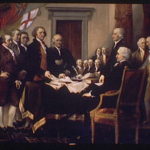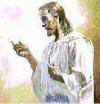
From John Locke, A number of times throughout history, tyranny has stimulated breakthrough thinking about liberty. This was certainly the case in England with the mid-seventeenth-century era of repression, rebellion, and civil war. There was a tremendous outpouring of political pamphlets and tracts. By far the most influential writings emerged from the pen of scholar John Locke.
He expressed the radical view that government is morally obliged to serve people, namely by protecting life, liberty, and property. He explained the principle of checks and balances to limit government power. He favored representative government and a rule of law. He denounced tyranny. He insisted that when government violates individual rights, people may legitimately rebel.

These views were most fully developed in Locke’s famous Second Treatise Concerning Civil Government, and they were so radical that he never dared sign his name to it. He acknowledged authorship only in his will. Locke’s writings did much to inspire the libertarian ideals of the American Revolution. This, in turn, set an example which inspired people throughout Europe, Latin America, and Asia…
Locke established that private property is absolutely essential for liberty: “every Man has a Property in his own Person. This no Body has any Right to but himself. The Labour of his Body, and the Work of his Hands, we may say, are properly his.” He continues: “The great and chief end therefore, of Mens uniting into Commonwealths, and putting themselves under Government, is the Preservation of their Property.”
Locke believed people legitimately turned common property into private property by mixing their labor with it, improving it. Marxists liked to claim this meant Locke embraced the labor theory of value, but he was talking about the basis of ownership rather than value.
He insisted that people, not rulers, are sovereign. Government, Locke wrote, “can never have a Power to take to themselves the whole or any part of the Subjects Property, without their own consent. For this would be in effect to leave them no Property at all.” He makes his point even more explicit: rulers “must not raise Taxes on the Property of the People, without the Consent of the People, given by themselves, or their Deputies.”
From “John Locke and the Jews” by Nabil I. Matar: From the Journal of Ecclesiastical History, Jan 1993:
In 1813, a century after the death of John Locke, an anonymous pamphleteer in London, writing under the pseudonym of ‘Abraham, saac and Jacob’, complained about the restrictions which were placed on the Jews. In The Lamentations of the Children of Israel representing the Hardships they suffer from the Penal Laws, the author recalled John Locke as a defender of the Jews, and quoted one of the philosopher’s favourable comparisons between Jews and Gentiles. The author evidently felt that Locke’s advocacy of toleration for dissenters in the second half of the seventeenth century could be applied to the Jews of nineteenth–century England: having argued in defence of non–Anglicans, Locke was believed to have argued for non–Christians too.

Doctrine and Covenants 98:55 And that law of the land which is constitutional, supporting that principle of freedom in maintaining rights and privileges, belongs to all mankind, and is justifiable before me.
Doctrine and Covenants 134:5 We believe that all men are bound to sustain and uphold the respective governments in which they reside, while protected in their inherent and inalienable rights by the laws of such governments; and that sedition and rebellion are unbecoming every citizen thus protected, and should be punished accordingly; and that all governments have a right to enact such laws as in their own judgments are best calculated to secure the public interest; at the same time, however, holding sacred the freedom of conscience.
Long live America. Help her to restore her freedoms. Fight the tyranny that is now upon us.
